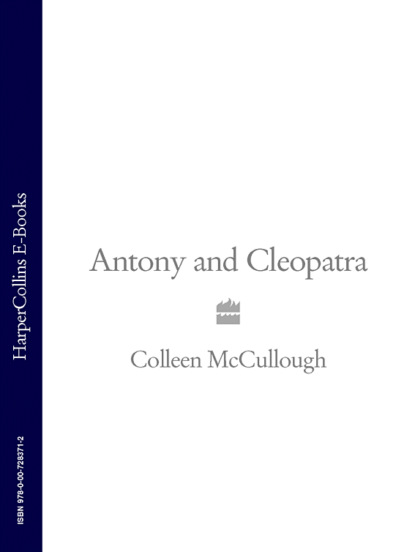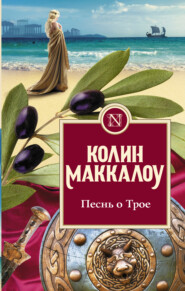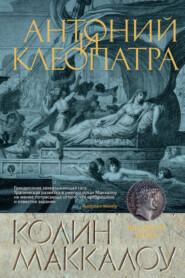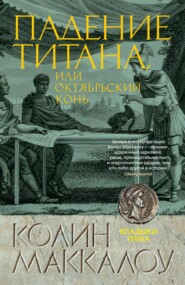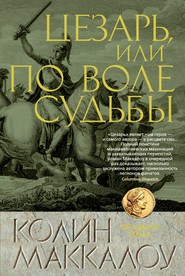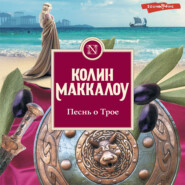По всем вопросам обращайтесь на: info@litportal.ru
(©) 2003-2024.
✖
Antony and Cleopatra
Автор
Год написания книги
2019
Настройки чтения
Размер шрифта
Высота строк
Поля
Antony and Cleopatra
Colleen McCullough
Passion, politics, love and death combine in a novel of the legendary love triangle between the three leaders of the Roman era: Cleopatra, Mark Antony and Octavian, from the bestselling author of The Thorn Birds.Mark Antony, famous warrior and legendary lover, expected that he would be Julius Caesar's successor. But after Caesar's murder it was his 18-year old nephew, Octavian, who was named in the will. No-one, least of all Antony, expected him to last but his youth and slight frame concealed a remarkable determination and a clear strategic sense.Antony was the leader of the fabulously rich East. Barely into his campaigning, he met Cleopatra, Pharaoh of Egypt. Bereft by the loss of Julius Caesar, her lover, father of her only son, she saw Antony as another Roman who could support her and provide more heirs. His fascination for her, his sense that she knew the way forward where he had lost his, led to the beginning of their passionate, and very public affair. The two men, twin rulers of Rome, might have found a way to live with each other but not with Cleopatra between them.This is a truly epic story of power and scandal, battle and passion, political spin and inexorable fate with a rich historical background and a remarkable cast of characters, all brought brilliantly to life by Colleen McCullough. It is hard to leave the world she has created.
COLLEEN McCULLOUGH
Antony and Cleopatra
Copyright
HarperCollinsPublishers Ltd. 1 London Bridge Street London, SE1 9GF
www.harpercollins.co.uk (http://www.harpercollins.co.uk)
This paperback edition 2008
First published by HarperCollinsPublishers 2007
Copyright © Colleen McCullough 2007
Colleen McCullough asserts the moral right to
be identified as the author of this work
A catalogue record for this book
is available from the British Library
This novel is entirely a work of fiction.
The names, characters and incidents portrayed in it are
the work of the author’s imagination, and, while
historical characters make appearances in the book,
this is a fictionalised account.
All rights reserved under International and Pan-American Copyright Conventions. By payment of the required fees, you have been granted the non-exclusive, non-transferable right to access and read the text of this ebook on-screen. No part of this text may be reproduced, transmitted, down-loaded, decompiled, reverse engineered, or stored in or introduced into any information storage and retrieval system, in any form or by any means, whether electronic or mechanical, now known or hereinafter invented, without the express written permission of HarperCollins ebooks.
HarperCollinsPublishers has made every reasonable effort to ensure that any picture content and written content in this ebook has been included or removed in accordance with the contractual and technological constraints in operation at the time of publication
Source ISBN: 9780007225804
Ebook edition: September 2008 ISBN: 9780007283712
Version: 2018-06-08
MAPS
For the unsinkable Anthony Cheethamwith love and enormous respect
CONTENTS
Title Page (#uf9d6f0c3-3aea-58d5-b79f-0aba1f8fb107)Copyright (#ubfb9bc8c-fc45-5580-998b-e7eb2d3e38a8)Maps (#u9ef2074f-83e9-5cbb-9ecd-41e8551d6021)PART I Antony in the East 41–40 B.C. (#uf37111c7-2a3e-421b-8c06-4d1c3af1cc6e)Chapter One (#u9c34e152-7145-530d-b97c-a6687b9c0f97)Chapter Two (#uf545d06c-d66b-50c5-8d2c-cb3fe6d5dfb1)Chapter Three (#ub837d62c-8f20-5602-8d06-9c69cd2f76fa)Chapter Four (#u73b1ee9b-bb6e-563f-8ee1-ce19a7a7b62f)Chapter Five (#u52421439-1770-5029-8de4-575d0503ff42)PART II Octavian in the West 41–39 B.C. (#ua5c38fe3-0d87-4105-8be3-204db7c69095)Chapter Six (#u40e500bc-17ff-5dab-9ed7-5b5e59b0bca7)Chapter Seven (#u4f460ca0-5480-5450-b3c9-d316d510aa29)Chapter Eight (#litres_trial_promo)Chapter Nine (#litres_trial_promo)Chapter Ten (#litres_trial_promo)PART III Victories and Defeats 39–37 B.C. (#ua5c38fe3-0d87-4105-8be3-204db7c69095)Chapter Eleven (#litres_trial_promo)Chapter Twelve (#litres_trial_promo)Chapter Thirteen (#litres_trial_promo)Chapter Fourteen (#litres_trial_promo)Chapter Fifteen (#litres_trial_promo)PART IV The Queen of Beasts 36–33 B.C. (#litres_trial_promo)Chapter Sixteen (#litres_trial_promo)Chapter Seventeen (#litres_trial_promo)Chapter Eighteen (#litres_trial_promo)Chapter Nineteen (#litres_trial_promo)Chapter Twenty (#litres_trial_promo)Chapter Twenty-One (#litres_trial_promo)Chapter Twenty-Two (#litres_trial_promo)Chapter Twenty-Three (#litres_trial_promo)Chapter Twenty-Four (#litres_trial_promo)PART V War 32–30 B.C. (#litres_trial_promo)Chapter Twenty-Five (#litres_trial_promo)Chapter Twenty-Six (#litres_trial_promo)Chapter Twenty-Seven (#litres_trial_promo)Chapter Twenty-Eight (#litres_trial_promo)PART VI Metamorphosis 29–27 B.C. (#litres_trial_promo)Chapter Twenty-Nine (#litres_trial_promo)Glossary (#litres_trial_promo)About the Author (#litres_trial_promo)By the Same Author (#litres_trial_promo)About the Publisher (#litres_trial_promo)
PART I
Antony in the East
41–40 B.C.
ONE
Quintus Dellius was not a warlike man, nor a warrior when in battle. Whenever possible he concentrated upon what he did best, namely to advise his superiors so subtly that they came to believe the ideas were genuinely theirs.
So after Philippi, in which conflict he had neither distinguished himself nor displeased his commanders, Dellius decided to attach his meager person to Mark Antony and go east.
It was never possible, Dellius reflected, to choose Rome; it always boiled down to choosing sides in the massive, convulsive struggles between men determined to control – no, be honest, Quintus Dellius! – determined to rule Rome. With the murder of Caesar by Brutus, Cassius and the rest, everyone had assumed that Caesar’s close cousin, Mark Antony, would inherit his name, his fortune, and his literally millions of clients. But what had Caesar done? Made a last will and testament that left everything to his eighteen-year-old great-nephew, Gaius Octavius! He hadn’t even mentioned Antony in that document, a blow from which Antony had never really recovered, so sure had he been that he would step into Caesar’s high red boots. And, typical Antony, he had made no plans to take second place. At first the youth everyone now called Octavian hadn’t worried him; Antony was a man in his prime, a famous general of troops and owner of a large faction in the Senate, whereas Octavian was a sickly adolescent as easy to crush as the carapace of a beetle. Only it hadn’t worked out that way, and Antony hadn’t known how to deal with a crafty, sweet-faced boy with the intellect and wisdom of a seventy-year-old. Most of Rome had assumed that Antony, a notorious spendthrift in desperate need of Caesar’s fortune to pay his debts, had been a part of the conspiracy to eliminate Caesar, and his conduct following the deed had only reinforced that. He made no attempt to punish the assassins; rather, he had virtually given them the full protection of the law. But Octavian, passionately attached to Caesar, had gradually eroded Antony’s authority and forced him to outlaw them. How had he done that? By suborning a good percentage of Antony’s legions to his own cause, winning over the People of Rome, and stealing the thirty thousand talents of Caesar’s war chest so brilliantly that no one, even Antony, had managed to prove that Octavian was the thief. Once Octavian had soldiers and money, he gave Antony no choice but to admit him into power as a full equal. After that, Brutus and Cassius made their own bid for power; uneasy allies, Antony and Octavian had taken their legions to Macedonia and met the forces of Brutus and Cassius at Philippi. A great victory for Antony and Octavian that hadn’t solved the vexed question of who would end in ruling as the First Man in Rome, an uncrowned king paying lip service to the hallowed illusion that Rome was a Republic, governed by an upper house, the Senate, and several Assemblies of the People. Together, the Senate and People of Rome: Senatus Populusque Romanus, SPQR.
Typically – Dellius’s thoughts meandered on – victory at Philippi had found Mark Antony without a viable strategy to put Octavian out of the power equation, for Antony was a force of Nature, lusty, impulsive, hot-tempered and quite lacking foresight. His personal magnetism was great, of that kind which draws men by virtue of the most masculine qualities: courage, an Herculean physique, a well-deserved reputation as a lover of women, and enough brain to make him a formidable orator in the House. His weaknesses tended to be excused, for they were equally masculine: pleasures of the flesh, and heedless generosity.
His answer to the problem of Octavian was to divide the Roman world between them, with a sop thrown to Marcus Lepidus, high priest and owner of a large senatorial faction. Sixty years of on-again, off-again civil war had finally bankrupted Rome, whose people – and the people of Italia – groaned under poor incomes, shortages of wheat for bread, and a growing conviction that the betters who ruled them were as incompetent as they were venal. Unwilling to see his status as a popular hero undermined, Antony resolved that he would take the lion’s share, leave the rotting carcass to that jackal Octavian.
So, after Philippi, the victors had carved up the provinces to suit Antony, not Octavian, who inherited the least enviable parts: Rome, Italia, and the big islands of Sicilia, Sardinia and Corsica, where the wheat was grown to feed the peoples of Italia, long since incapable of feeding themselves. It was a tactic in keeping with Antony’s character, ensuring that the only face Rome and Italia saw would belong to Octavian, while his own glorious deeds elsewhere were assiduously circulated throughout Rome and Italia. Octavian to collect the odium, himself the stout-hearted winner of laurels far from the center of government. As for Lepidus, he had charge of the other wheat province, Africa, a genuine backwater.
Ah, but Marcus Antonius did indeed have the lion’s share! Not only of the provinces, but of the legions. All he lacked was money, which he expected to squeeze out of that perennial golden fowl, the East. Of course he had taken all three of the Gauls for himself; though in the West, they were thoroughly pacified by Caesar, and rich enough to contribute funds for his coming campaigns. His trusted marshals commanded Gaul’s legions, of which there were many; Gaul could live without his presence.
Caesar had been killed within three days of setting out for the East, where he had intended to conquer the fabulously rich and formidable Kingdom of the Parthians, using its plunder to set Rome on her feet again. He had planned to be away for five years, and had planned his campaign with all his legendary genius. So now, with Caesar dead, it would be Marcus Antonius – Mark Antony – who conquered the Parthians and set Rome upon her feet again. Antony had conned Caesar’s plans and decided that they showed all the old boy’s brilliance, but that he himself could improve on them. One of the reasons why he had come to this conclusion lay in the nature of the group of men who went East with him; every last one of them was a crawler, a sucker-up, and knew exactly how to play that biggest of fish, Mark Antony, so susceptible to praise, flattery and the fleshpots.
Unfortunately Quintus Dellius did not yet have Antony’s ear, though his advice would have been equally flattering, balm to Antony’s ego. So, riding down the Via Egnatia on a galled and grumpy pony, his balls bruised and his unsupported legs aching, Quintus Dellius waited his chance, which still hadn’t come when Antony crossed into Asia and stopped in Nicomedia, the capital of his province of Bithynia.
Somehow, every potentate and client-king Rome owned in the East had sensed that the great Marcus Antonius would head for Nicomedia, and had scuttled there in their dozens, commandeering the best inns or setting up camp in style on the city’s outskirts. A beautiful place on its dreamy, placid inlet, a place that most people had forgotten lay very close to dead Caesar’s heart. But, because it had, Nicomedia still looked prosperous, for Caesar had exempted it from taxes, and Brutus and Cassius, hurrying west to Macedonia, had not ventured north enough to rape it the way they had raped a hundred cities from Judaea to Thrace. Thus the pink and purple marble palace in which Antony took up residence was able to offer legates like Dellius a tiny room in which to stow his luggage and the senior among his servants, his freedman Icarus. That done, Dellius sallied forth to see what was going on, and work out how he was going to snaffle a place on a couch close enough to Antony to participate in the Great Man’s conversation during dinner.
Kings aplenty thronged the public halls, ashen-pale, hearts palpitating because they had backed Brutus and Cassius. Even old King Deiotarus of Galatia, senior in age and years of service, had made the effort to come, escorted by the two among his sons whom Dellius presumed were his favorites. Antony’s bosom friend Poplicola had pointed out Deiotarus to him, but after that Poplicola admitted himself at a loss – too many faces, not enough service in the East to recognize them.
Smilingly demure, Dellius moved among the groups in their outlandish apparel, eyes glistening at the size of an emerald or the weight of gold upon a coiffed head. Of course he had good Greek, so Dellius was able to converse with these absolute rulers of places and peoples, his smile growing wider at the thought that, despite the emeralds and the gold, every last one of them was here to pay obsequious homage to Rome, their ultimate ruler. Rome, who had no king, whose senior magistrates wore a simple, purple-bordered white toga and prized the iron ring of some senators over a ton of gold rings; an iron ring meant that a Roman family had been in and out of office for five hundred years. A thought that made poor Dellius automatically hide his gold senatorial ring in a fold of toga; no Dellius had yet reached the consulship, no Dellius had been prominent a hundred years ago, let alone five. Caesar had worn an iron ring, but Antony did not; the Antonii were not quite antique enough. And Caesar’s iron ring had gone to Octavian.
Oh, air, air! He needed fresh air!
The palace was built around a huge peristyle garden that had a fountain at its middle athwart a long, shallow pool. It was fashioned of pure white Parian marble on a fishy theme – mermen, tritons, dolphins – and it was rare in that it had never been painted to imitate real life’s colors. Whoever had sculpted its glorious creatures had been a master. A connoisseur of fine art, Dellius gravitated to the fountain so quickly that he failed to notice that someone had beaten him to it, was sitting in a dejected huddle on its broad rim. As Dellius neared, the fellow lifted his head; no chance to avoid a meeting now.
He was a foreigner, and a noble one, for he wore an expensive robe of Tyrian purple brocade artfully interwoven with gold thread, and upon a head of snakelike, greasy black curls sat a skullcap made of cloth of gold. Dellius had seen enough Easterners to know that the curls were not dirty greasy; Easterners pomaded their locks with perfumed creams. Most of the royal supplicants inside were Greeks whose ancestors had dwelled in the East for centuries, but this man was a genuine Asian local of a kind Dellius recognized because there were many like him living in Rome. Oh, not clad in Tyrian purple and gold! Sober fellows who favored homespun fabrics in dark plain colors. Even so, the look was unmistakable; he who sat on the edge of the fountain was a Jew.
‘May I join you?’ Dellius asked in Greek, his smile charming.
An equally charming smile appeared on the stranger’s jowly face; a perfectly manicured hand flashing with rings gestured. ‘Please do. I am Herod of Judaea.’
‘And I am Quintus Dellius, Roman legate.’
Colleen McCullough
Passion, politics, love and death combine in a novel of the legendary love triangle between the three leaders of the Roman era: Cleopatra, Mark Antony and Octavian, from the bestselling author of The Thorn Birds.Mark Antony, famous warrior and legendary lover, expected that he would be Julius Caesar's successor. But after Caesar's murder it was his 18-year old nephew, Octavian, who was named in the will. No-one, least of all Antony, expected him to last but his youth and slight frame concealed a remarkable determination and a clear strategic sense.Antony was the leader of the fabulously rich East. Barely into his campaigning, he met Cleopatra, Pharaoh of Egypt. Bereft by the loss of Julius Caesar, her lover, father of her only son, she saw Antony as another Roman who could support her and provide more heirs. His fascination for her, his sense that she knew the way forward where he had lost his, led to the beginning of their passionate, and very public affair. The two men, twin rulers of Rome, might have found a way to live with each other but not with Cleopatra between them.This is a truly epic story of power and scandal, battle and passion, political spin and inexorable fate with a rich historical background and a remarkable cast of characters, all brought brilliantly to life by Colleen McCullough. It is hard to leave the world she has created.
COLLEEN McCULLOUGH
Antony and Cleopatra
Copyright
HarperCollinsPublishers Ltd. 1 London Bridge Street London, SE1 9GF
www.harpercollins.co.uk (http://www.harpercollins.co.uk)
This paperback edition 2008
First published by HarperCollinsPublishers 2007
Copyright © Colleen McCullough 2007
Colleen McCullough asserts the moral right to
be identified as the author of this work
A catalogue record for this book
is available from the British Library
This novel is entirely a work of fiction.
The names, characters and incidents portrayed in it are
the work of the author’s imagination, and, while
historical characters make appearances in the book,
this is a fictionalised account.
All rights reserved under International and Pan-American Copyright Conventions. By payment of the required fees, you have been granted the non-exclusive, non-transferable right to access and read the text of this ebook on-screen. No part of this text may be reproduced, transmitted, down-loaded, decompiled, reverse engineered, or stored in or introduced into any information storage and retrieval system, in any form or by any means, whether electronic or mechanical, now known or hereinafter invented, without the express written permission of HarperCollins ebooks.
HarperCollinsPublishers has made every reasonable effort to ensure that any picture content and written content in this ebook has been included or removed in accordance with the contractual and technological constraints in operation at the time of publication
Source ISBN: 9780007225804
Ebook edition: September 2008 ISBN: 9780007283712
Version: 2018-06-08
MAPS
For the unsinkable Anthony Cheethamwith love and enormous respect
CONTENTS
Title Page (#uf9d6f0c3-3aea-58d5-b79f-0aba1f8fb107)Copyright (#ubfb9bc8c-fc45-5580-998b-e7eb2d3e38a8)Maps (#u9ef2074f-83e9-5cbb-9ecd-41e8551d6021)PART I Antony in the East 41–40 B.C. (#uf37111c7-2a3e-421b-8c06-4d1c3af1cc6e)Chapter One (#u9c34e152-7145-530d-b97c-a6687b9c0f97)Chapter Two (#uf545d06c-d66b-50c5-8d2c-cb3fe6d5dfb1)Chapter Three (#ub837d62c-8f20-5602-8d06-9c69cd2f76fa)Chapter Four (#u73b1ee9b-bb6e-563f-8ee1-ce19a7a7b62f)Chapter Five (#u52421439-1770-5029-8de4-575d0503ff42)PART II Octavian in the West 41–39 B.C. (#ua5c38fe3-0d87-4105-8be3-204db7c69095)Chapter Six (#u40e500bc-17ff-5dab-9ed7-5b5e59b0bca7)Chapter Seven (#u4f460ca0-5480-5450-b3c9-d316d510aa29)Chapter Eight (#litres_trial_promo)Chapter Nine (#litres_trial_promo)Chapter Ten (#litres_trial_promo)PART III Victories and Defeats 39–37 B.C. (#ua5c38fe3-0d87-4105-8be3-204db7c69095)Chapter Eleven (#litres_trial_promo)Chapter Twelve (#litres_trial_promo)Chapter Thirteen (#litres_trial_promo)Chapter Fourteen (#litres_trial_promo)Chapter Fifteen (#litres_trial_promo)PART IV The Queen of Beasts 36–33 B.C. (#litres_trial_promo)Chapter Sixteen (#litres_trial_promo)Chapter Seventeen (#litres_trial_promo)Chapter Eighteen (#litres_trial_promo)Chapter Nineteen (#litres_trial_promo)Chapter Twenty (#litres_trial_promo)Chapter Twenty-One (#litres_trial_promo)Chapter Twenty-Two (#litres_trial_promo)Chapter Twenty-Three (#litres_trial_promo)Chapter Twenty-Four (#litres_trial_promo)PART V War 32–30 B.C. (#litres_trial_promo)Chapter Twenty-Five (#litres_trial_promo)Chapter Twenty-Six (#litres_trial_promo)Chapter Twenty-Seven (#litres_trial_promo)Chapter Twenty-Eight (#litres_trial_promo)PART VI Metamorphosis 29–27 B.C. (#litres_trial_promo)Chapter Twenty-Nine (#litres_trial_promo)Glossary (#litres_trial_promo)About the Author (#litres_trial_promo)By the Same Author (#litres_trial_promo)About the Publisher (#litres_trial_promo)
PART I
Antony in the East
41–40 B.C.
ONE
Quintus Dellius was not a warlike man, nor a warrior when in battle. Whenever possible he concentrated upon what he did best, namely to advise his superiors so subtly that they came to believe the ideas were genuinely theirs.
So after Philippi, in which conflict he had neither distinguished himself nor displeased his commanders, Dellius decided to attach his meager person to Mark Antony and go east.
It was never possible, Dellius reflected, to choose Rome; it always boiled down to choosing sides in the massive, convulsive struggles between men determined to control – no, be honest, Quintus Dellius! – determined to rule Rome. With the murder of Caesar by Brutus, Cassius and the rest, everyone had assumed that Caesar’s close cousin, Mark Antony, would inherit his name, his fortune, and his literally millions of clients. But what had Caesar done? Made a last will and testament that left everything to his eighteen-year-old great-nephew, Gaius Octavius! He hadn’t even mentioned Antony in that document, a blow from which Antony had never really recovered, so sure had he been that he would step into Caesar’s high red boots. And, typical Antony, he had made no plans to take second place. At first the youth everyone now called Octavian hadn’t worried him; Antony was a man in his prime, a famous general of troops and owner of a large faction in the Senate, whereas Octavian was a sickly adolescent as easy to crush as the carapace of a beetle. Only it hadn’t worked out that way, and Antony hadn’t known how to deal with a crafty, sweet-faced boy with the intellect and wisdom of a seventy-year-old. Most of Rome had assumed that Antony, a notorious spendthrift in desperate need of Caesar’s fortune to pay his debts, had been a part of the conspiracy to eliminate Caesar, and his conduct following the deed had only reinforced that. He made no attempt to punish the assassins; rather, he had virtually given them the full protection of the law. But Octavian, passionately attached to Caesar, had gradually eroded Antony’s authority and forced him to outlaw them. How had he done that? By suborning a good percentage of Antony’s legions to his own cause, winning over the People of Rome, and stealing the thirty thousand talents of Caesar’s war chest so brilliantly that no one, even Antony, had managed to prove that Octavian was the thief. Once Octavian had soldiers and money, he gave Antony no choice but to admit him into power as a full equal. After that, Brutus and Cassius made their own bid for power; uneasy allies, Antony and Octavian had taken their legions to Macedonia and met the forces of Brutus and Cassius at Philippi. A great victory for Antony and Octavian that hadn’t solved the vexed question of who would end in ruling as the First Man in Rome, an uncrowned king paying lip service to the hallowed illusion that Rome was a Republic, governed by an upper house, the Senate, and several Assemblies of the People. Together, the Senate and People of Rome: Senatus Populusque Romanus, SPQR.
Typically – Dellius’s thoughts meandered on – victory at Philippi had found Mark Antony without a viable strategy to put Octavian out of the power equation, for Antony was a force of Nature, lusty, impulsive, hot-tempered and quite lacking foresight. His personal magnetism was great, of that kind which draws men by virtue of the most masculine qualities: courage, an Herculean physique, a well-deserved reputation as a lover of women, and enough brain to make him a formidable orator in the House. His weaknesses tended to be excused, for they were equally masculine: pleasures of the flesh, and heedless generosity.
His answer to the problem of Octavian was to divide the Roman world between them, with a sop thrown to Marcus Lepidus, high priest and owner of a large senatorial faction. Sixty years of on-again, off-again civil war had finally bankrupted Rome, whose people – and the people of Italia – groaned under poor incomes, shortages of wheat for bread, and a growing conviction that the betters who ruled them were as incompetent as they were venal. Unwilling to see his status as a popular hero undermined, Antony resolved that he would take the lion’s share, leave the rotting carcass to that jackal Octavian.
So, after Philippi, the victors had carved up the provinces to suit Antony, not Octavian, who inherited the least enviable parts: Rome, Italia, and the big islands of Sicilia, Sardinia and Corsica, where the wheat was grown to feed the peoples of Italia, long since incapable of feeding themselves. It was a tactic in keeping with Antony’s character, ensuring that the only face Rome and Italia saw would belong to Octavian, while his own glorious deeds elsewhere were assiduously circulated throughout Rome and Italia. Octavian to collect the odium, himself the stout-hearted winner of laurels far from the center of government. As for Lepidus, he had charge of the other wheat province, Africa, a genuine backwater.
Ah, but Marcus Antonius did indeed have the lion’s share! Not only of the provinces, but of the legions. All he lacked was money, which he expected to squeeze out of that perennial golden fowl, the East. Of course he had taken all three of the Gauls for himself; though in the West, they were thoroughly pacified by Caesar, and rich enough to contribute funds for his coming campaigns. His trusted marshals commanded Gaul’s legions, of which there were many; Gaul could live without his presence.
Caesar had been killed within three days of setting out for the East, where he had intended to conquer the fabulously rich and formidable Kingdom of the Parthians, using its plunder to set Rome on her feet again. He had planned to be away for five years, and had planned his campaign with all his legendary genius. So now, with Caesar dead, it would be Marcus Antonius – Mark Antony – who conquered the Parthians and set Rome upon her feet again. Antony had conned Caesar’s plans and decided that they showed all the old boy’s brilliance, but that he himself could improve on them. One of the reasons why he had come to this conclusion lay in the nature of the group of men who went East with him; every last one of them was a crawler, a sucker-up, and knew exactly how to play that biggest of fish, Mark Antony, so susceptible to praise, flattery and the fleshpots.
Unfortunately Quintus Dellius did not yet have Antony’s ear, though his advice would have been equally flattering, balm to Antony’s ego. So, riding down the Via Egnatia on a galled and grumpy pony, his balls bruised and his unsupported legs aching, Quintus Dellius waited his chance, which still hadn’t come when Antony crossed into Asia and stopped in Nicomedia, the capital of his province of Bithynia.
Somehow, every potentate and client-king Rome owned in the East had sensed that the great Marcus Antonius would head for Nicomedia, and had scuttled there in their dozens, commandeering the best inns or setting up camp in style on the city’s outskirts. A beautiful place on its dreamy, placid inlet, a place that most people had forgotten lay very close to dead Caesar’s heart. But, because it had, Nicomedia still looked prosperous, for Caesar had exempted it from taxes, and Brutus and Cassius, hurrying west to Macedonia, had not ventured north enough to rape it the way they had raped a hundred cities from Judaea to Thrace. Thus the pink and purple marble palace in which Antony took up residence was able to offer legates like Dellius a tiny room in which to stow his luggage and the senior among his servants, his freedman Icarus. That done, Dellius sallied forth to see what was going on, and work out how he was going to snaffle a place on a couch close enough to Antony to participate in the Great Man’s conversation during dinner.
Kings aplenty thronged the public halls, ashen-pale, hearts palpitating because they had backed Brutus and Cassius. Even old King Deiotarus of Galatia, senior in age and years of service, had made the effort to come, escorted by the two among his sons whom Dellius presumed were his favorites. Antony’s bosom friend Poplicola had pointed out Deiotarus to him, but after that Poplicola admitted himself at a loss – too many faces, not enough service in the East to recognize them.
Smilingly demure, Dellius moved among the groups in their outlandish apparel, eyes glistening at the size of an emerald or the weight of gold upon a coiffed head. Of course he had good Greek, so Dellius was able to converse with these absolute rulers of places and peoples, his smile growing wider at the thought that, despite the emeralds and the gold, every last one of them was here to pay obsequious homage to Rome, their ultimate ruler. Rome, who had no king, whose senior magistrates wore a simple, purple-bordered white toga and prized the iron ring of some senators over a ton of gold rings; an iron ring meant that a Roman family had been in and out of office for five hundred years. A thought that made poor Dellius automatically hide his gold senatorial ring in a fold of toga; no Dellius had yet reached the consulship, no Dellius had been prominent a hundred years ago, let alone five. Caesar had worn an iron ring, but Antony did not; the Antonii were not quite antique enough. And Caesar’s iron ring had gone to Octavian.
Oh, air, air! He needed fresh air!
The palace was built around a huge peristyle garden that had a fountain at its middle athwart a long, shallow pool. It was fashioned of pure white Parian marble on a fishy theme – mermen, tritons, dolphins – and it was rare in that it had never been painted to imitate real life’s colors. Whoever had sculpted its glorious creatures had been a master. A connoisseur of fine art, Dellius gravitated to the fountain so quickly that he failed to notice that someone had beaten him to it, was sitting in a dejected huddle on its broad rim. As Dellius neared, the fellow lifted his head; no chance to avoid a meeting now.
He was a foreigner, and a noble one, for he wore an expensive robe of Tyrian purple brocade artfully interwoven with gold thread, and upon a head of snakelike, greasy black curls sat a skullcap made of cloth of gold. Dellius had seen enough Easterners to know that the curls were not dirty greasy; Easterners pomaded their locks with perfumed creams. Most of the royal supplicants inside were Greeks whose ancestors had dwelled in the East for centuries, but this man was a genuine Asian local of a kind Dellius recognized because there were many like him living in Rome. Oh, not clad in Tyrian purple and gold! Sober fellows who favored homespun fabrics in dark plain colors. Even so, the look was unmistakable; he who sat on the edge of the fountain was a Jew.
‘May I join you?’ Dellius asked in Greek, his smile charming.
An equally charming smile appeared on the stranger’s jowly face; a perfectly manicured hand flashing with rings gestured. ‘Please do. I am Herod of Judaea.’
‘And I am Quintus Dellius, Roman legate.’





